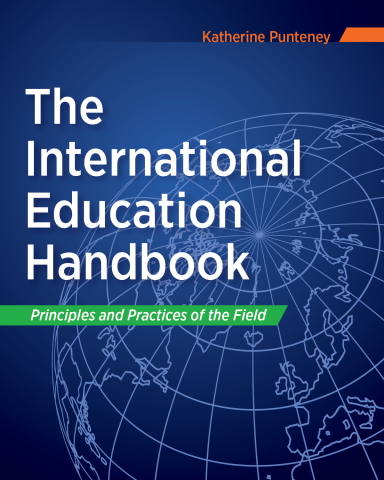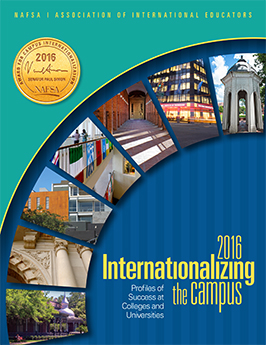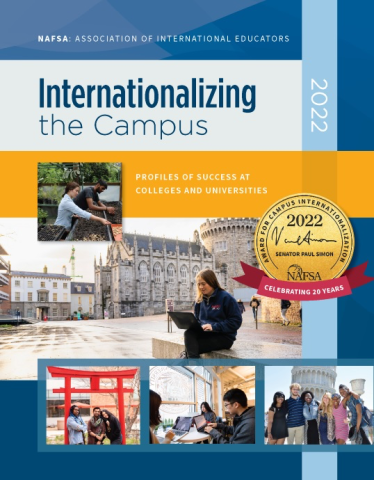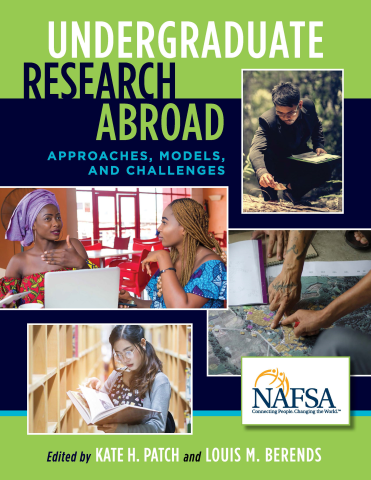The International Education Handbook: Principles and Practices of the Field
The International Education Handbook: Principles and Practices of the Field provides a comprehensive overview of key sectors of the field of international education, highlighting the information and trends most relevant to international educators, particularly those new to the field. This resource is particularly valuable for graduate students in international education, student affairs, and higher education administration.
Topics include:
- global competence
- models of education abroad and experiential learning
- international student recruitment and advising
- citizen diplomacy.
As a companion to handbook the Facilitator's Guide offers student learning outcomes, discussion and reflection questions, and classroom and online activities to reinforce the curriculum and apply it to real-life scenarios.
About the author: Katherine Punteney is the founder of the Master of Arts in International Education Management Program at the Middlebury Institute of International Studies at Monterey. As chair and associate professor, her teaching and research focus is on higher education and K–12 internationalization, intercultural competence, and international student and scholar services. With more than 20 years’ experience as a practitioner, Punteney most enjoys mentoring new professionals as they explore the international education field.
Table of Contents:
Introduction
- The Profession of International Education
- Chapter Oerview
- Facilitator's Guide
- Resources
- References
1: Trends in International Education
- Trend 1: Growth of the Knowledge Economy
- Trend 2: Massification of Education
- Trend 3: Insufficient Public Funding of Higher Education
- Trend 4: Academic Capitalism
- Trend 5: Commodification of Education
- Trend 6: Internationalization of Education
- Trend 7: Growth in Cross-Border Education
- Trend 8: Proliferation of English Language Programs
- Trend 9: Demand for Quality Assurance in International Education
- Trend 10: Competition for Global Rankings
- Conclusion
- References
2: Global Competence
- Terminology and Definitions
- Rationales for Global Competence Education
- Global Competence Models
- Core Concepts of Global Competence
- Assessment of Global Competence
- Assessment Principles
- Considerations for Global Competence Education
- Conclusion
- Resources
- References
3: Internationalization
- Internationalization of Higher Education
- Internationalization Activities
- Internationalization Planning
- Regional Differences in Approaches to Internationalization
- Considerations for Internationalization
- Conclusion
- Resources
- References
4: Education Abroad
- U.S. Study Abroad
- Access, Inclusion, and Equity
- Program Models
- Program Design Processes
- Roles and Responsibilities of Education Abroad Professionals
- Professional Organizations and Standards
- Conclusion
- Resources
- References
5: Experiential Education
- Experiential Education Theory
- International Experiential Education
- Program Types
- Partnerships
- Management Roles and Responsibilities
- Facilitation of Experiential Education
- Conclusion
- Resources
- References
6: International Enrollment Management
- International Students in the United States
- National Enrollment Management Policies
- Responsibility for International Enrollment Management
- International Enrollment Management Strategic Planning
- International Student Recruitment Methods and Channels
- Marketing and Brand Management
- International Student Admissions
- International Student Retention
- Considerations for International Enrollment Management
- Conclusion
- Resources
- References
7: International Student and Scholar Services
- Benefits of Hosting International Students and Scholars
- Adjustments to the United States
- Acculturation Process
- Support Services
- Advising
- Advising Approaches
- Supportive Programming
- Professional Skills and Specialties
- Considerations for Practitioners
- Conclusion
- Resources
- References
8: International Schools
- History of International Schools
- Growth of International Schools
- Definitions and Types of International Schools
- International Schools in Public Education
- International Baccalaureate
- Rationales for Adopting the International Baccalaureate Curriculum in Public Education
- Internationalization in the United States
- Internationalization Strategies
- Teacher Training and Development
- Considerations for Practitioners
- Future Trends
- Conclusion
- Resources
- References
9: Citizen Diplomacy
- History of U.S. Citizen Diplomacy
- Size of the Sector
- Program Models
- Citizen Diplomacy Program Examples
- Impact of Citizen Diplomacy Programs
- Administration of Citizen Diplomacy Programs
- Assessment of Citizen Diplomacy
- Considerations for Practitioners
- Conclusion
- Resources
- References
10: Related Fields
- Comparative and International Education
- Global Mobility
- Higher Education Administration
- Intercultural Training
- International Development and Education
- Language Program Administration
- Peacebuilding
- Student Services
- Conclusion
- References

The International Education Handbook: Principles and Practices of the Field
The International Education Handbook: Principles and Practices of the Field provides a comprehensive overview of key sectors of the field of international education, highlighting the information and trends most relevant to international educators, particularly those new to the field. This resource is particularly valuable for graduate students in international education, student affairs, and higher education administration.
Topics include:
- global competence
- models of education abroad and experiential learning
- international student recruitment and advising
- citizen diplomacy.
As a companion to handbook the Facilitator's Guide offers student learning outcomes, discussion and reflection questions, and classroom and online activities to reinforce the curriculum and apply it to real-life scenarios.
About the author: Katherine Punteney is the founder of the Master of Arts in International Education Management Program at the Middlebury Institute of International Studies at Monterey. As chair and associate professor, her teaching and research focus is on higher education and K–12 internationalization, intercultural competence, and international student and scholar services. With more than 20 years’ experience as a practitioner, Punteney most enjoys mentoring new professionals as they explore the international education field.
Table of Contents:
Introduction
- The Profession of International Education
- Chapter Oerview
- Facilitator's Guide
- Resources
- References
1: Trends in International Education
- Trend 1: Growth of the Knowledge Economy
- Trend 2: Massification of Education
- Trend 3: Insufficient Public Funding of Higher Education
- Trend 4: Academic Capitalism
- Trend 5: Commodification of Education
- Trend 6: Internationalization of Education
- Trend 7: Growth in Cross-Border Education
- Trend 8: Proliferation of English Language Programs
- Trend 9: Demand for Quality Assurance in International Education
- Trend 10: Competition for Global Rankings
- Conclusion
- References
2: Global Competence
- Terminology and Definitions
- Rationales for Global Competence Education
- Global Competence Models
- Core Concepts of Global Competence
- Assessment of Global Competence
- Assessment Principles
- Considerations for Global Competence Education
- Conclusion
- Resources
- References
3: Internationalization
- Internationalization of Higher Education
- Internationalization Activities
- Internationalization Planning
- Regional Differences in Approaches to Internationalization
- Considerations for Internationalization
- Conclusion
- Resources
- References
4: Education Abroad
- U.S. Study Abroad
- Access, Inclusion, and Equity
- Program Models
- Program Design Processes
- Roles and Responsibilities of Education Abroad Professionals
- Professional Organizations and Standards
- Conclusion
- Resources
- References
5: Experiential Education
- Experiential Education Theory
- International Experiential Education
- Program Types
- Partnerships
- Management Roles and Responsibilities
- Facilitation of Experiential Education
- Conclusion
- Resources
- References
6: International Enrollment Management
- International Students in the United States
- National Enrollment Management Policies
- Responsibility for International Enrollment Management
- International Enrollment Management Strategic Planning
- International Student Recruitment Methods and Channels
- Marketing and Brand Management
- International Student Admissions
- International Student Retention
- Considerations for International Enrollment Management
- Conclusion
- Resources
- References
7: International Student and Scholar Services
- Benefits of Hosting International Students and Scholars
- Adjustments to the United States
- Acculturation Process
- Support Services
- Advising
- Advising Approaches
- Supportive Programming
- Professional Skills and Specialties
- Considerations for Practitioners
- Conclusion
- Resources
- References
8: International Schools
- History of International Schools
- Growth of International Schools
- Definitions and Types of International Schools
- International Schools in Public Education
- International Baccalaureate
- Rationales for Adopting the International Baccalaureate Curriculum in Public Education
- Internationalization in the United States
- Internationalization Strategies
- Teacher Training and Development
- Considerations for Practitioners
- Future Trends
- Conclusion
- Resources
- References
9: Citizen Diplomacy
- History of U.S. Citizen Diplomacy
- Size of the Sector
- Program Models
- Citizen Diplomacy Program Examples
- Impact of Citizen Diplomacy Programs
- Administration of Citizen Diplomacy Programs
- Assessment of Citizen Diplomacy
- Considerations for Practitioners
- Conclusion
- Resources
- References
10: Related Fields
- Comparative and International Education
- Global Mobility
- Higher Education Administration
- Intercultural Training
- International Development and Education
- Language Program Administration
- Peacebuilding
- Student Services
- Conclusion
- References
Reviews
"As someone who teaches on the internationalization of higher education and contributes to its scholarship, I am excited about this important new book. Equipping our future leaders of international education with the tools and competencies they will need is critical for the field and beyond. This book covers many of the most important themes in today’s international education landscape and will help to foster best practices in program design and management."—Bernhard T. Streitwieser, assistant professor of international education and international affairs, George Washington University
"This inspirational, broad-ranging volume is a state-of-the-art exploration of why international education matters and why it matters now. Its seamless organization allows for the integration and connection of concepts and frameworks, and at the same time it acknowledges the complexities involved in this vibrant and fast-growing field. —Joanna Regulska, vice provost and associate chancellor for global affairs, Office of the Chancellor and Provost, University of California, Davis
"The International Education Handbook is the resource we have all been waiting for. This will be a critical reference tool for international education students, teachers, and professionals alike. It will play a key role in better linking the study of international education with its real-life practice."—Clare Overmann, head of higher education initiatives, Institute of International Education
"Each chapter is thought provoking and encourages reflection. As an experienced international educator, this book helped strengthen and reinforce my understanding, while renewing my energy and commitment to the field."—Parinaz Zartoshty, director of international student and scholar services, San José State University
"The internationalization of higher education and institutions’ abilities to prepare students to engage locally and globally depends on international education practitioners’ knowledge and skills. This profession only recently emerged and continues to develop. Even those charged with facilitating campus internationalization may have limited understandings of the different roles and responsibilities of international education practitioners. This volume will help illuminate these for both those entering the profession and those within it. All will find definitions of relevant terms and concepts helpful to advancing students’ international educations." —Elizabeth Brewer, director of international education, Beloit College






